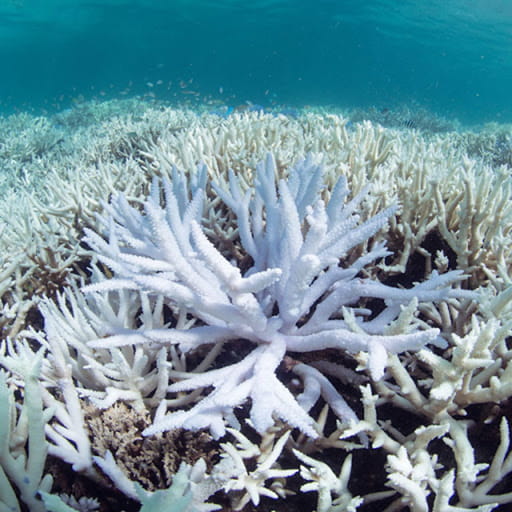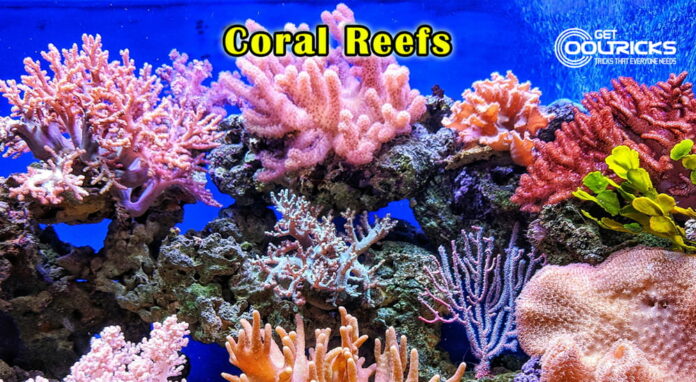About Coral Bleaching
Also Read Coral Reefs
- Coral bleaching occurs when coral polyps expel algae that live inside their tissues. Normally, coral polyps live in an endosymbiotic relationship with these algae, which are crucial for the health of the coral and the reef.
- The algae provide up to 90 percent of the coral’s energy. Bleached corals continue to live but begin to starve after bleaching.
- The leading cause of coral bleaching is rising water temperatures.

- A temperature about 1 °C (or 2 °F) above average can cause bleaching.
- According to the United Nations Environment Programme, between 2014 and 2016 the longest recorded global bleaching events killed coral on an unprecedented scale.
- In 2016, the bleaching of coral on the Great Barrier Reef killed between 29 and 50 percent of the reef’s coral.
- In 2017, the bleaching extended into the central region of the reef.
- The average interval between bleaching events has halved between 1980 and 2016.
Factors responsible for Coral Bleaching
- Increased water temperature (most commonly due to global warming), or reduced water temperatures
- Oxygen starvation caused by an increase in zooplankton levels
- Increased solar irradiance (photosynthetic active radiation and ultraviolet light)
- Increased sedimentation (due to silt runoff)
- Bacterial infections
- Changes in salinity
- Herbicides
- Extreme low tide and exposure
- Cyanide fishing
- Pollutants such as oxybenzone, butylparaben, octyl methoxycinnamate, or enzacamene: are four common sunscreen ingredients that are nonbiodegradable and can wash off of skin
- Ocean acidification due to elevated levels of CO2 caused by air pollution
- Being exposed to Oil or other chemical spills
Causes of Coral Bleaching
- As coral reef bleaching is a general response to stress, it can be induced by a variety of factors, alone or in combination.
- It is therefore difficult to unequivocally identify the causes for bleaching events.
- The following stressors have been implicated in coral reef bleaching events.
- Temperature
- Coral species live within a relatively narrow temperature margin and therefore, low and high sea temperatures can induce coral bleaching. Bleaching events occur during sudden temperature drops accompanying intense upwelling episodes, seasonal cold-air outbreaks etc.
- Solar Irradiance
- Bleaching during the summer months, during seasonal temperature and irradiance maxima often occurs disproportionately in shallow-living corals and on the exposed summits of colonies.
- Subaerial Exposure
- Sudden exposure of reef flat corals to the atmosphere during events such as extremely low tides, ENSO-related sea level drops or tectonic uplift can potentially induce bleaching.
- Fresh Water Dilution
- Rapid dilution of reef waters from storm-generated precipitation and runoff has been demonstrated to cause coral reef bleaching.
- Other causes include the increase in the concentration of inorganic Nutrients, sedimentation, oxygen starvation caused by an increase in zooplankton levels as a result of overfishing, ocean acidification, changes in salinity, sea level change due to global warming, cyanide fishing etc.
- Temperature
Global initiatives for coral reefs protection
Various global and regional initiatives exist around the world, focused on different aspects of research, information-sharing, conservation, and management related to coral reefs. These initiatives support countries in their efforts to achieve the Aichi Biodiversity Targets and Sustainable Development Goals.
- International year of the reef
- Ecologically or biologically significant areas
- Sustainable ocean initiative
- UN Environment global coral reef partnership
- International coral reef initiative
- Reef resilience network
- Global coral reef monitoring network
- Ocean biogeographic information system
- Global ocean acidification observing network (GOA-ON)
- Ramsar convention
- Coral triangle initiative
Way forward
As many as 10 per cent of coral reefs have degraded; another 30 per cent are likely to disappear within the next 20 years across the globe. According to biologists, if proper conservation and management measures are not taken, all coral reefs of the Indo-Malayan region may disappear in the next 40 years.
An integrated coastal management plan is the need of the hour for the effective management of coral reefs. An act to protect them from man-made activities is needed.
Overexploitation of corals should be strictly checked, and fishing activities causing damage to corals should be banned.
Pollution caused by domestic sewage, industrial wastes, chemicals, and fertilizers should be restricted. Anchoring of boats in the areas where coral reef areas are present should be banned.
Mangrove forests play a crucial role in helping the coral reef system by acting as filters and providing protection from cyclones, storms, and tsunamis. Destruction of mangrove forests in the reef areas should be prohibited. Planting of mangrove species in reef areas can be undertaken with the involvement and support of the local community.
The authorities concerned should create awareness about the importance of the coral reefs among the fishermen and other local public. The important ecological values and other benefits of the coral reefs should be taught to school and college students.


